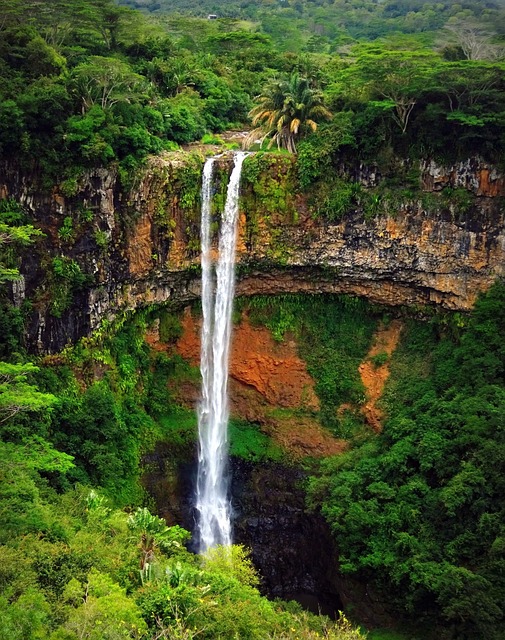
Mauritius is a beautiful tropical paradise located in the Indian Ocean. Offering stunning beaches, varied culture and great history. Let’s explore 12 fascinating facts about this unique country.
1. Volcanic Origin
Mauritius was created by volcanic activity approximately 8 million years ago. This geological history has shaped the island’s terrain, resulting in stunning mountain ranges, lush valleys, and picturesque waterfalls. The tallest peak on the island is Piton de la Petite Rivière Noire, rising 828 meters above sea level and offering spectacular views of the surrounding landscapes.
2. Diverse Islands
Many people think of Mauritius as one island, when it is actually an archipelago. The Republic of Mauritius consists of the island of Mauritius, together with other islands called Rodrigues, Agaléga, and St. Brandon. Each of these is unique and has its particular attractions which the visitors explore.
3. No Official Language
Mauritius is one of the very few countries in the world with no declared official language. The government and business sectors, however, widely use English, while French is used in informal life. As expected of a place bearing diverse cultural influences, Mauritian Creole, a French-based creole language, is generally spoken by the population.
4. Colony to Three European Powers
Mauritius is a nation steeped in a very rich history of European colonization. First, it was the Dutch in 1638; subsequently, the French arrived in 1715, and finally, the British invasion of 1810 completed this checkered colonial record. One of its consequences has been monumental in the culture, architecture, and even the legal system of this country.
5. Dodo’s Home
Mauritius is famously the former home of a flightless bird, the dodo, which became extinct in the late 17th century. The dodo has become an iconic image of extinction and a reminder to everyone of the importance of conservation efforts. Today visitors can learn about the history of the dodo at different museums and conservation centers throughout the island.
6. Cultural Melting Pot
Mauritius is widely known for the diversified population occupying this island: Indian, African, Chinese, and European. This cultural diversity can be reflected in festivals, cuisine, and traditions. Such richness of culture can be experienced by guests through visits to local markets, attending religious festivals, or listening to traditional music and dance performances.
7. High Literacy Rate
Mauritius is proud to join the leading countries with the highest rates of literacy in Africa—sitting with over 90% citizens literate. Education is valued by this nation, with schooling being free from primary to tertiary levels. This focus on education helped propel the economic development of the country and its high standards of living.
8. Very Religious
Mauritius is a very religious country, with a varied spiritual landscape. According to the recent statistics, Hindu followers were approximately 48.5%, thus being the largest religious group. Christianity came in second, mainly Roman Catholics, at about 32.7 percent of the population. After that is Islam, at 17.3%. Other religions, including Buddhism and traditional beliefs, are only 1.5%. This religious diversity is reflected in the many temples, churches and mosques on the island, where Mauritians are actively involved in religious festivals and religious ceremonies all over the year.
9. Multiple Climates
Though small in size, Mauritius is home to different microclimates. The central plateau is cooler and wetter than the coastal regions, while to the east, it appears to be windier compared to the western side, which is relatively more sheltered. This climatic diversity contributes to the varied ecosystems found on this island and confers a wide reach to agricultural activities.
You may be interested in:
>>>10 Common Myths About Mauritius Debunked
>>>12 Fascinating Facts About Mauritius
10. Peaceful Nation
Mauritius has founded a peaceful and stable political state. It does not have a standing army but maintains the security through the well-organized police force. This peaceable reputation contributed much to the success of making Mauritius a tourist destination and attractive to foreign investors.
11. Unique Natural Attractions
Some of the natural wonders in Mauritius are certainly the Seven Colored Earths of Chamarel—the kind of geological formation having sand dunes with seven visibly distinct colors—and the underwater waterfall illusion off Le Morne, formed by sand and silt deposits that appear when viewed from the air.
12. Country’s Name
The name “Mauritius” comes from an interesting origin. It was named by the Dutch after Prince Maurice van Nassau, Stadtholder of the Dutch Republic, at that time when they first took colonization of the island in the 17th century. The name stuck through various colonial periods into independence.
What makes Mauritius so unique and fascinating is that it offers both the visitor and the resident a blend of natural beauty, cultural diversity, and historical features. From its volcanic origin to its peaceful reputation, high literacy rate, and unique natural wonders, Mauritius continues to attract people from all over the world.
